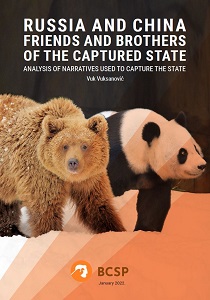

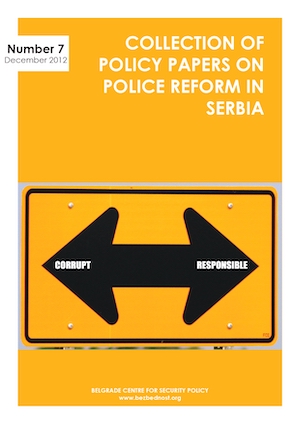
Manifestations of police corruption may be different and they are varying from those with less harmless consequences to those considered as criminal offences under the law. Successful prevention and suppression of corruption requires the establishment of police service control mechanisms and identification of corruption risks. In Serbia, the coherent system of internal oversight of the police is not functioning and this system together with the institutions for external oversight and control ensures that the police act according to the set rules and at the same time increases the accountability and integrity of police officers. This situation leads to increased opportunities for corruption. Consequently, the citizens’ confidence in the police is lower. Additionally, there is no clear list of corruption risks in the police. Therefore, the aim of the policy study is to fill this gap. First of all, the paper identifies the importance of external and internal oversight of the police in preventing and suppressing police corruption. Internal and external controllers play a significant role in eliminating corruption risks which are addressed in the second part of the paper based on typology of police corruption risks drafted by Transparency International. However, for a successful fight against police corruption it is necessary to eliminate deficiencies in the police internal control authorities and in external oversight institutions, which will be presented in the third and the fourth part of the paper. Finally, the paper presents guidelines for improving the fight against police corruption.
More...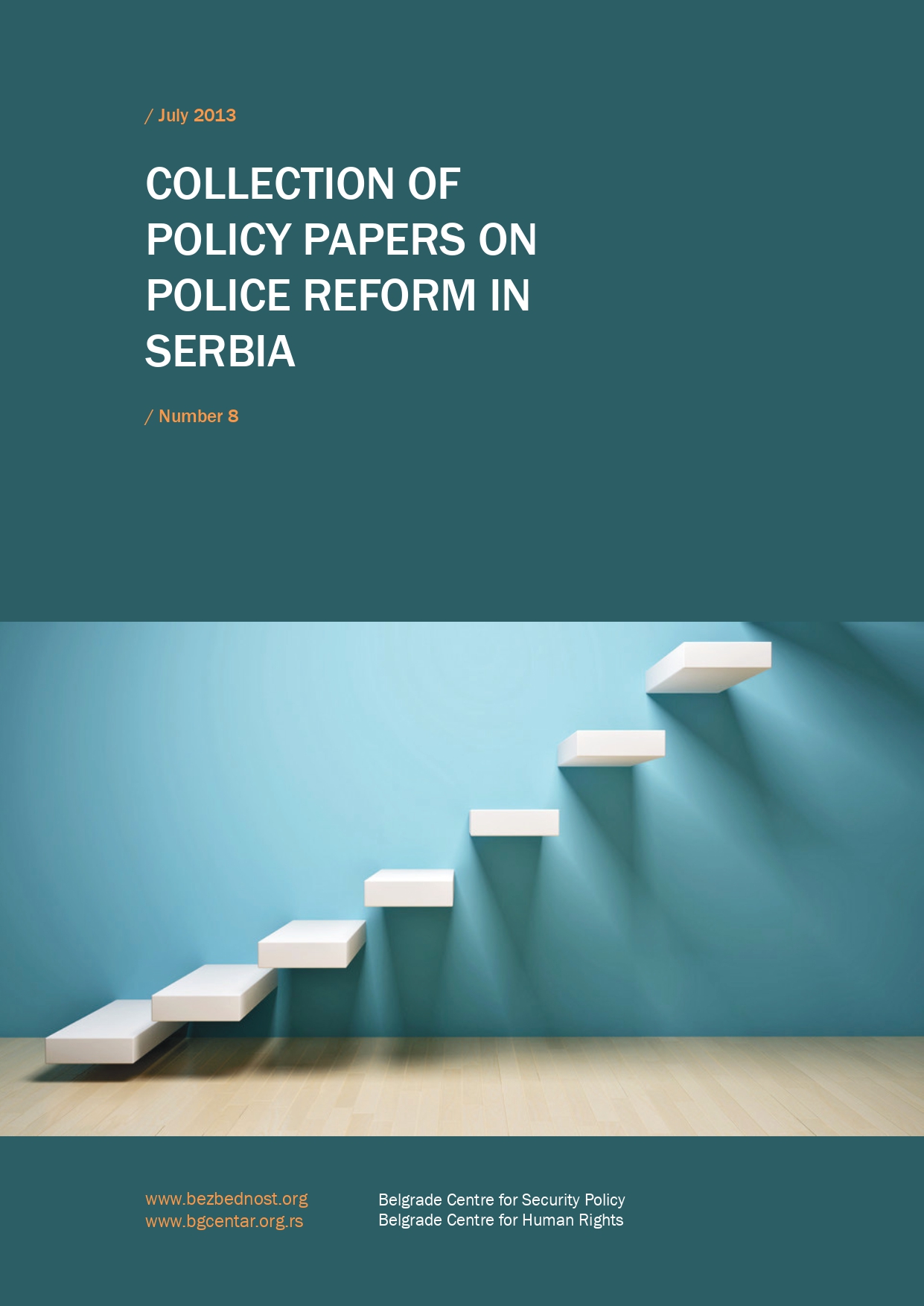
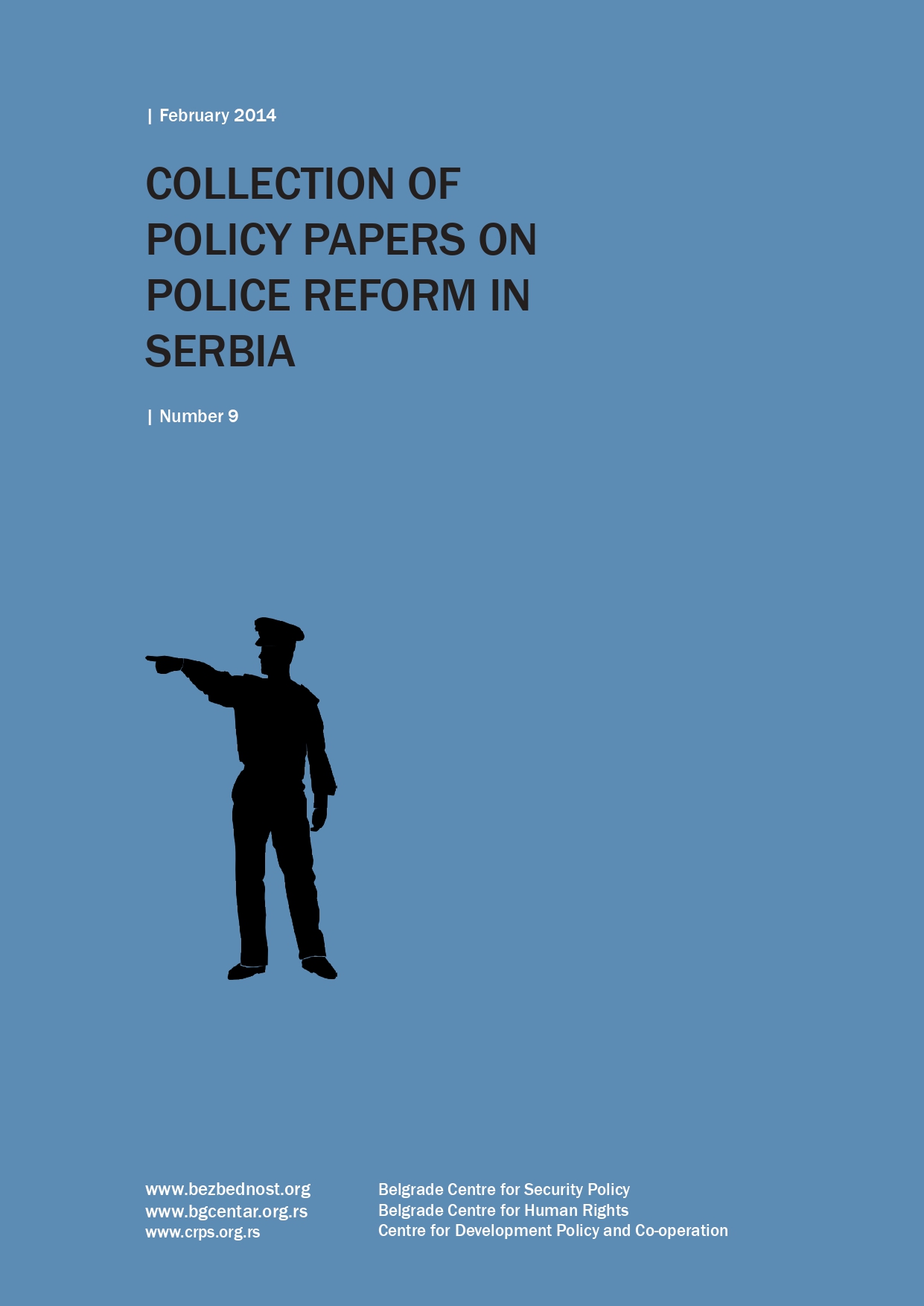

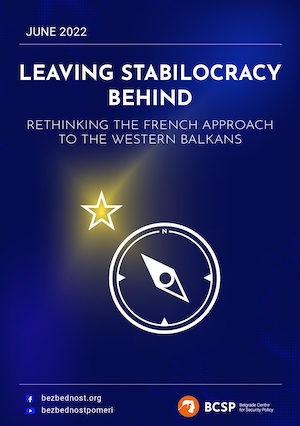
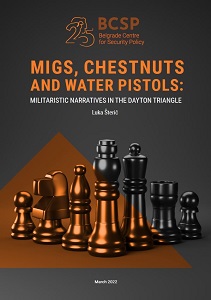
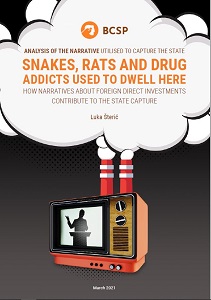
Foreign direct investments are the cornerstone of the current government’s economic policy. In their statements, the officials call them drivers of development, saying that they have enabled the revival of the economy and turned Serbia into the “economic tiger of Southeast Europe.”1 The fact that the value of the investments Serbia has managed to attract is greater “than what was achieved by all the countries of the Western Balkans put together” 2 is often mentioned as the key measure of success. However, the story of brilliant success quickly loses its lustre when one considers the long-term effects and all-encompassing consequences of this policy. Due to the way they are contracted and implemented, foreign direct investments represent one of the key mechanisms for capturing the state. Hiding behind the stories of a better future and new jobs, the government is breaking down the system of legal regulations and statutory procedures, promoting private interest to the detriment of the public one, and using foreign investments as propaganda ammunition to legitimise unlimited power. The results of such policy are a number of negative consequences for the state and the citizens, such as the increase of public debt, dramatic violation of workers’ rights and alarming problems with environmental pollution. In order to mask the negative consequences and legitimise the policy of attracting foreign investors based on the above described pattern, a complex narrative has been developed presenting foreign investments as a successful, and the only possible, model for state development. This meta-narrative about progress, which media are building up every day, is based on four basic component narratives: on the economic revival, on the efficiency of personal rule, on transparent contracts and on the opponents of Serbia’s development who ‘unfoundedly’ criticise the government’s economic success. In the analysis of the narrative we will focus on the statements of officials made since2012, which is when the regime led by the Serbian Progressive Party came to power. Many of the described mechanisms, such as non-transparent, harmful contracts and unjustifiably high subsidies, also existed during the previous government.3 However, the capture of the state, carried out - among other things - with the help of foreign direct investments, has reached completely new dimensions under the current regime, while the narratives that accompany it have been significantly ‘improved’.
More...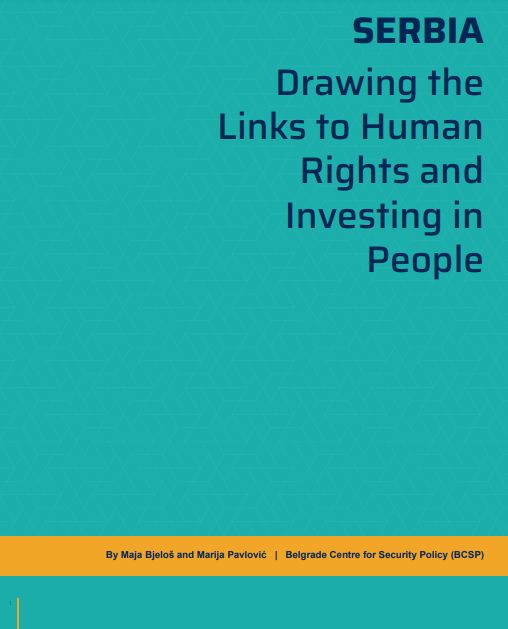
Keywords: Cyber attacks; Cybercrime; Information and Communication Technology; Privacy violations; Human rights; Biometric surveillance; Democracy; Internet fraud; Identity theft
Cybercrime and cybersecurity have become critical issues in Serbia, reflecting a global trend of increasing cyber threats. In 2020, Serbia experienced approximately 26 million significant cyberattacks, including unauthorized data collection and intrusions into ICT systems. Citizens also faced severe violations of privacy, an uptick in attacks on human rights defenders, and challenges related to emerging technologies like biometric surveillance. Public concerns highlight the risk of these technologies being misused against citizens amid democratic backsliding. Recent incidents, such as internet fraud targeting major institutions and a cyberattack on Serbia's cadastre, underscore the urgent need for robust cybersecurity measures. Despite advances in the legal framework—anchored by the 2016 Law on Information Security and aligned with EU standards—implementation lags behind the evolving threats. Serbia’s cybersecurity landscape includes provisions for protecting critical infrastructure and digital networks while addressing cybercrime through international conventions like the Budapest Convention. The Belgrade Centre for Security Policy conducted a baseline analysis and interviews with stakeholders in early 2022 to evaluate the effectiveness of Serbia’s institutional and legal response to cybersecurity challenges. Although the country has made significant progress in legislative development, the enforcement of these measures remains insufficient to address the growing complexity of cyber threats. The report emphasizes the necessity for the state to uphold human rights and the rule of law while enhancing its capacity to combat cybersecurity risks effectively.
More...
Keywords: Procurement; police; Ministry of Internal Affairs
The Ministry of Internal Affairs in Serbia plans to spend 8% of the budget (about six billion dinars) for the procurement of much-needed equipment, uniforms, and technology and to invest in the development of police capacities. Purposeful spending of these funds will significantly improve the work of the police and improve the safety of citizens. That is why it is important to wisely plan and spend every dinar. Improving the expediency of public procurement implies improving efficiency, effectiveness and economy in tenders.
More...
Keywords: Gender analysis; gender studies; security sector
Gender analysis investigates the relationships and differences between men and women in their respective roles, status, position in the society, and privileges. If we understand gender differences, this will enable us to understand the effects that existing or planned policies, programmes, and ways in which services are provided, have on different gender groups, as well as to improve the position of a gender group in less favourable position. Conducting the gender analysis is absolutely necessary in the processes of creating and implementing the strategies and policies since it enables us to take account of their different implications for different gender groups. In this text we will present the development of interest for gender mainstreaming and gender analysis, concrete steps in the implementation of this analysis, and the most significant theoretical-methodological approaches to gender analysis. Possibilities for the application of gender analysis in security sector – when creating and reforming the policies, formulating and revising the legislation, planning the services, and planning and implementing the projects, are presented here below in more detail and appertaining examples are provided.
More...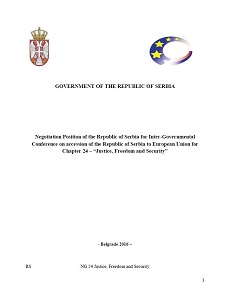
Keywords: European Union; EU accession; Serbia; international relations
Republic of Serbia accepts the EU acquis with respect to Chapter 23 Judiciary and Fundamental Rights as it stands on 1 January 2016 and will be in the position to implement it fully by the time it accesses to EU membership. Republic of Serbia will have implemented any outstanding acquis, by the date of accession, subject to the outcome of the negotiations under this chapter. Republic of Serbia stands aware of the financial burden arising from the commitments in this Chapter and is willing to undertake these obligations. Republic of Serbia does not request specific adaptations under this chapter.
More...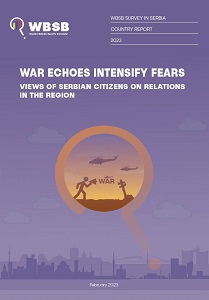
Keywords: public opinion; regional relations; Western Balkans; war in Ukraine
The Belgrade Centre for Security Policy conducted the annual public opinion survey on relations in the region, with a special focus on the Western Balkan countries and current events and trends. This report analyses Serbian citizens’ views on three main topics – the possibility of conflicts in the Balkans, Serbia’s bilateral relations with its neighbours, as well as key benefits and opportunities of regional cooperation and initiatives. Due to the current war in Ukraine and the war-mongering rhetoric in the Balkans, the fear of outbreak of conflict in the Balkans has risen. Compared to results from 2020, when more than half of citizens were not afraid of possible conflicts at all, the 2022 survey shows that almost two thirds of respondents are to a certain extent afraid of the outbreak of conflicts in the region in the next five years. Concerning potential causes of the conflict in the region, two-thirds of Serbian citizens believe that it is very or somewhat likely that a conflict might break out over the status of Kosovo. On the other hand, the results of the survey indicate a significant decrease in support of the reintroduction of mandatory military service, in comparison to results from 2020. When it comes to bilateral relations between Serbia and its neighbouring countries, the data shows a decline in support for potential separation of Republic of Srpska from Bosnia and Herzegovina and unification with Serbia. Citizens believe that relations between Serbia and Montenegro have not improved significantly, despite the signing of the Fundamental Agreement with the Serbian Orthodox Church. On the contrary, the negative perception of Serbian public towards Albania has slightly improved over the last two years, mainly due to the closer cooperation between the leaders of the two countries through the Open Balkan initiative. However, regional relations are still seen as strained, in part due to the promotion of the concept of Serbian world which creation is supported by slightly more than 40% of citizens. In 2022, the focus of the public in terms of regional cooperation was directed more directly to the Open Balkan initiative as a platform for collaboration between Albania, North Macedonia and Serbia. Although the data show an increase in the number of Serbian citizens who are familiar with the idea, there are still no concrete and publicly visible results of the initiative
More...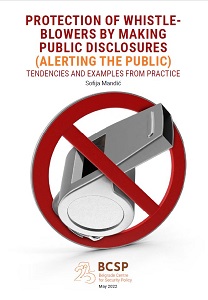
Keywords: Whistleblowers;
Public disclosures may be made, without prior notice to the employer or authorised agency, in case of imminent peril against life, public health, security, environment, large-scale damage, i.e. imminent peril of evidence destruction. Albeit there are understandably tightened requirements for direct public address, the law noticeably places the bar for peril requirements too high – it is not sufficient to have a peril at hand (against life, public health, security, environment, large-scale damage, evidence destruction), but it must also be imminent. The term ‘imminent’ relates to a precisely specific moment when the specific peril occurs and becomes certain. Only then is a whistle-blower entitled to address the public without repercussions and with hopes of court protection.
More...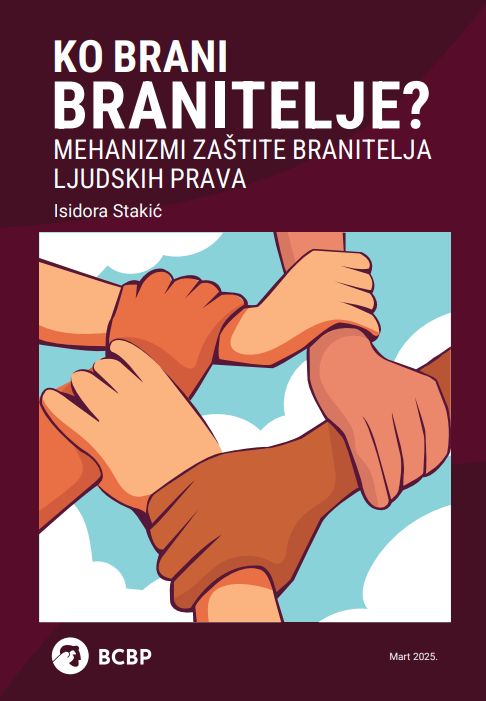
Keywords: Human rights; Colombia; Mexico; DR Congo; Philippines; Turkey; Serbia; defamation campaigns; legal persecution
Human rights defenders are people who act independently or jointly to improve human rights and basic freedoms and fight for their protection at local, national and international levels. As a rule, defenders' activities run counter to the interests of the powerful, be it governments or private corporations, and therefore need protection. This study analyzes legal and institutional instruments for the protection of veterans at the international level and in six countries: Colombia, Mexico, DR Congo, the Philippines, Turkey and Serbia. In these countries, human rights defenders are in a difficult situation, in which they face numerous threats and pressures - from police repression, through defamation campaigns to legal persecution. Therefore, these are countries where there is a need for additional protection of veterans, but (still) a significant gap between the normative level and practice.
More...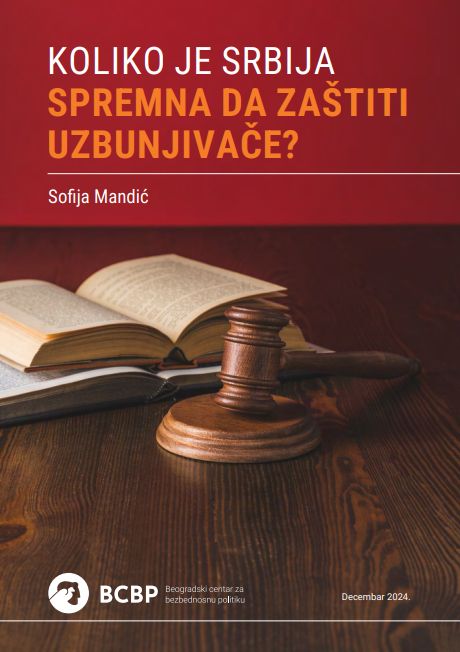
Keywords: Serbia; whistleblower; judicial protection
In 2024, Serbia will mark ten years since the adoption of the Law on the Protection of Whistleblowers. During the past decade, there was no serious and comprehensive assessment of its application by the Serbian authorities, and despite declarative statements and assumed strategic commitments, the protection of whistleblowers never became a real political or judicial priority in Serbia. The report "How ready is Serbia to protect whistleblowers?" analyzes and evaluates the performance of institutions for the protection of whistleblowers, presents the outcomes of cases in which whistleblowers have sought judicial protection, and identifies strengths and weaknesses in practices that lead to good or unsatisfactory case outcomes.
More...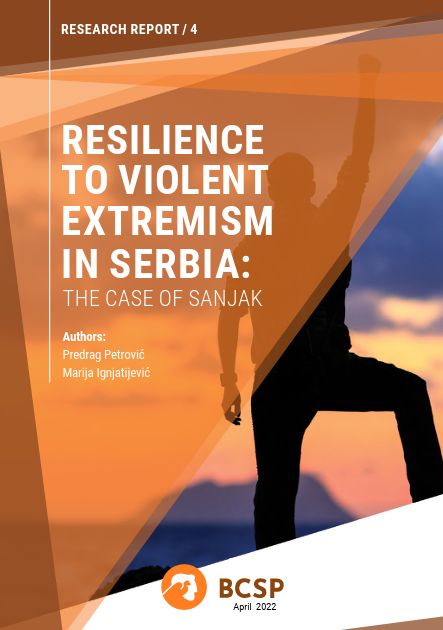
Keywords: Challenges Risks and Threats; Extremism; Islamist extremism
Many experts had gloomy forecasts about violent Islamist extremism and terrorism in Serbia. Sanjak – the southwest region in Serbia populated by Muslim majority – was even dubbed Jihadist hotbed, as it was the center for further spreading ultra-conservative Salafism from the neighboring Bosnia and Herzegovina into Serbia, and a region where the recruitment of Syrian foreign fighters took place. Among the most influential militant Salafi leaders in Vienna who maintained contacts with ISIS there were individuals from Sanjak. However, despite these forecasts and the presence of both push and pull factors of violent extremism, Sanjak has proved to be very resilient to violent Islamist extremism. Compared to other countries in the Western Balkans, a relatively small number of people from Serbia (49 of them including women and children) joined militant Islamist groups in Syria. Only a few incidents involving militant Salafis and failed terrorist plots happened. People in Sanjak showed both resilience to violent extremism and to the spread of the ultra-conservative interpretation of Islam.
More...